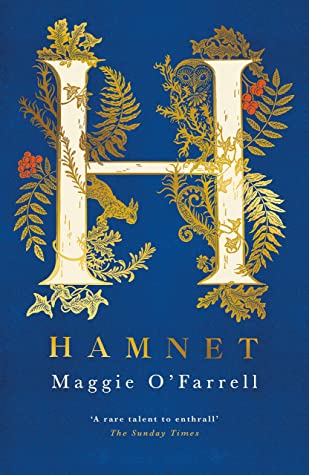Six Degrees of Separation: January 2021
Six Degrees of Separation is hosted by Kate of booksaremyfavouriteandbest.com.
This month we start with Maggie O'Farrell's acclaimed novel Hamnet, which won the Women's Prize for Fiction last year. I haven't read this, but I know it's a fictionalised account of the death of Shakespeare's son, and the effects of grief on his parents and sisters.
I couldn't face any more books about grief. I thought about making clever links to Shakespeare instead but found I wasn't nearly clever enough, so I decided to go off on a tangent of my own and choose Green Eggs and Ham(net...) by Dr Seuss. My children loved this iconic book, with its brilliant rhymes and simple - but so recognisable - story. What a genius this man was.
From green eggs to hardly any eggs, my next choice is Few Eggs and No Oranges by Vere Hodgson, first published in 1976 by Dennis Dobson, and republished by Persephone in 1999. The niece of a marine biologist on Captain Scott's ship HMS Discovery, Vere Hodgson was born in Birmingham, taught in Tuscany, and lived in London throughout the Second World War, working for a Notting Hill-based charity. She kept a diary throughout her life, and edited part of it to produce this fascinating book, which opens as the Blitz begins and ends in 1945.
From oranges to Bitter Lemons, Lawrence Durrell's collection of memories from the three years he spent on Cyprus in the 1950s. I first read this book when I was at school, simply because I found it on the shelves of my much-loved local library. I probably missed many subtleties, but I do remember laughing at the story of Durrell trying to buy a house on this idyllic, unspoilt island. Water rights, so important before the days of piped supplies, were owned by entire families, each member of whom had to consent to any transfer, and if this weren't enough of a challenge the modern property market has nothing on the histrionics of the wife of Durrell's seller. It's by no means all comedy - there's increasing unrest and violence as the island seeks to rid itself of British rule, and Durrell eventually has to leave in a hurry - but the descriptions of local life are wonderful;
'It seemed in that warm honey-gold afternoon a delectable island in which to spend some years of one's life.'
In 1957 Bitter Lemons won the Duff Cooper Prize for the best work of history, biography, political science or poetry, and it remains a very entertaining, informative and readable book.
And finally to a book which I haven't yet read, but very much look forward to reading. Dara McAnulty's Diary of a Young Naturalist won the 2020 Wainwright Prize for Nature Writing. I heard Dara read part of his book on Radio 4, and I was so impressed with his story. As an autistic child he was bullied at school for much of his early life, but his family and his interest in the natural world around him have got him through. His close-knit parents and siblings are neither rich nor are they famous, but the love and mutual support they give one another shines out as clearly as Dara's love for the animals, birds and trees in his local area (or areas - the family has moved many times);
'Some people believe that roots grow from bricks and mortar, but ours spread like mycelium networks, connected to a well of life lived together, so that wherever we go we stay rooted....We're as close as otters and, huddled together, we make our way in the world.'
I'm surprised to see that four of my books this month are non-fiction. I find I'm reading more of this lately, though fiction will always be my first love.
On February 6th we will start with Anne Tyler's Redhead by the Side of the Road. You can link to your next five books in any way you like, so why not join in? (See full instructions here: https://booksaremyfavouriteandbest.com/6-degrees-of-separation-meme/)








Oh, good for you for jumping so quickly away from death and pain. It made for a really fun and lovely chain!
ReplyDeleteThank you! I'm going to start reading everyone's chains tomorrow, been a bit busy this weekend but I'm looking forward to seeing what everyone made of this.
DeleteI see our great minds think alike, as I also made the Green Eggs and Ham connection! A nice cheery trip to the natural world is just what I needed, thank you!
ReplyDeleteThanks! I've just read yours and commented - very interesting re the difference between our own and our children's childhood tastes.
DeleteGreat work! I still need to watch The Durrells. I'd love a copy of that Amateur Naturalist book. I got the Diary of a Young Naturalist last month and want to start on it soon.
ReplyDeleteThanks. The Durrells is great, wonderful comfort viewing - I almost wish I hadn't watched it when it came out, as then I'd still have it to look forward to! Might just watch it all again.
DeleteI think I'll buy Dara's book. I had been hoping to listen to his complete reading on BBC Sounds, but they only kept it on for a very short time, unfortunately.